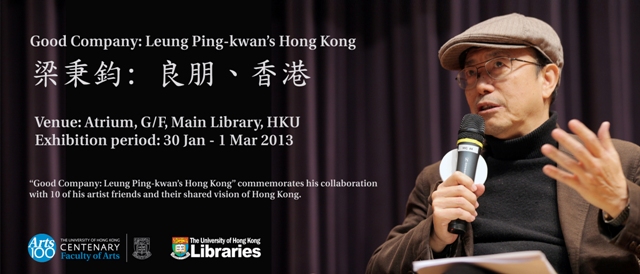A tribute to Leung Ping Kwan
Many of Ping Kwan’s friends and admirers have talked about the way his work reached out to other forms and media, pictorial, filmic, and performance. It seems appropriate that when he first came to Hong Kong University, to the Department of English Studies and Comparative Literature where we first knew him, it was as a teacher of translation. His life itself was a sort of translation, a carrying-across and bringing-together – in his famous sociability, his genius for friendship, and also in intellectual and aesthetic ways. Some writers cultivate a kind of purity, but Ping Kwan’s instincts were all for inclusiveness: as a man and as a poet, he was all generosity.
One aspect of this gift for translation was his work between Chinese and English. It would be hard to think of a more Hong Kong person – and for many of us he embodied the best of this city – but he was also gifted in English, a good translator, and a writer who paid close attention to the travels of his own work across various language divides. His legendary collaborations with the American poet Gordon Osing, which produced the bilingual City at the End of Time, were a good example, combining a boozy and happy-go-lucky companionship with careful attention to language, so that the English versions are remarkable in themselves as poems, new creations rather than faithful renditions of the original. And of course PK was endlessly curious and highly promiscuous in his reading, in Chinese and far beyond, a true comparatist. He was certainly a Hong Kong poet, a local one, but he was never provincial.
You would not describe him as a confessional poet, but all his work is autobiographical, drawing on his experience of his home and his travels, the things he saw from day to day and made remarkable by the quality of his attention (the most important of a poet’s gifts). If you had never met him, you could still get a strong sense of his personality from the poems. They are often conversational, and give the impression of being improvised from one line to the next even when in fact they are very cunningly structured. They don’t stand on ceremony, but have a welcoming quality, inviting the reader in. This hospitality was very strong, in the poet and the man.
Leung Ping Kwan had no problems with identity: he knew who he was, and was comfortable in himself. But he also knew where he was, and that famous feeling for place was embedded in an unillusioned understanding of Hong Kong’s situation, or predicament – colonial, postcolonial, and whatever we are now – and he commented sharply on these things and did not compromise. He was never pompous, never unkind, and, it seemed, never afraid. That voice, now silent, is irreplaceable.
But because he was so much a part of the life of this city, there are things all around us that will keep his memory fully alive, including many humble and unobtrusive things that he taught us to look at with respect and enjoyment. Those of us who worked in the old Main Building at Hong Kong University, where the Department of English Studies and Comparative Literature was housed, learned to see it anew after reading “An Old Colonial Building”, that extraordinary and subtle meditation on history and place. But at the same time we will probably never feel quite the same about bitter-melon, or beancurd. The poems were indeed like the man, with an affable and disarming surface, and beneath it a playful and exploratory curiosity, and a depth of integrity.
We miss him, and extend our deepest sympathy to his family.
Elaine Ho & Douglas Kerr
Message from Faculty of Arts

<梁秉鈞:良朋、香港>展覽,紀念梁秉鈞 (也斯) 與他十位藝術家朋友的合作,透過詩與攝影兩種不同媒介,共同創造出對香港感性的觀點,獨特的視野。詩文創作,是梁秉鈞畢生心之所繫。同樣地,對他不同年代交過的朋友,梁秉鈞的神采笑語,洋溢著他對友情的肯定。詩友相交,互為潤澤。這次展覽,同時展出香港大學圖書館收藏梁秉鈞一系列的文學作品,包括由早期至最近出版的詩、小說、散文和翻譯等。
You are cordially invited to attend the Opening Ceremony of the exhibition: “Good Company: Leung Ping-kwan’s Hong Kong” commemorating the work of our city’s foremost literary voice, Ye Si (也斯), who sadly passed away on January 5, 2013. The Dean of Arts, Professor Kam Louie, University Librarian, Mr Peter Sidorko, and Professor Elaine Ho of the School of English will officiate at the Ceremony.
Opening Ceremony
Date: January 30, 2013 (Wednesday)
Time: 6:00 pm
Venue: Atrium, G/F, Main Library, HKU
Language: English
The exhibition is inspired by Leung Ping-kwan’s (known by his pen name Ye Si) collaboration with 10 artist friends and communicates their shared vision of Hong Kong. Five of the exhibits have not been shown before. Poetry and literary creation were central to Ye Si’s life; so was friendship. The exhibition shows how friendship and poetry can nourish each other, displaying the author’s poems alongside his friends’ photographs. It also offers a bibliographical survey of Leung Ping-kwan’s work in three genres – poetry, prose, fiction – from earlier to more recent times. The exhibition will run from January 30 to March 1, 2013.
The Opening Ceremony will be followed by a Memorial Gathering, led by Dr Esther Cheung, staff, students and alumni of the Department of Comparative Literature:
Memorial Gathering
Date: January 30, 2013 (Wednesday)
Time: 6:30 pm – 7:30 pm
Venue: 1/F, Special Collections, Main Library, HKU
Language: Cantonese and English
Please register for the Memorial Gathering at the following link: http://arts.hku.hk/leungpingkwanshongkong
The exhibition “Good Company: Leung Ping-kwan’s Hong Kong” is held as part of the Faculty of Arts Centenary and is co-organised by The University of Hong Kong Libraries.
Entrance is free of charge. All are welcome.
For enquiries, please contact Mr Cyrus Chan at cyrusc@hku.hk or 3917 4984.

Our apologies, you must be logged in to post a comment.